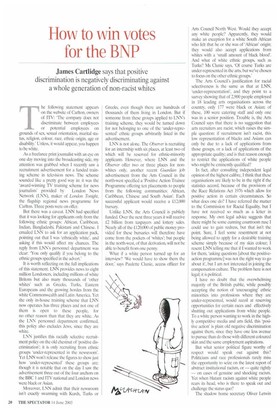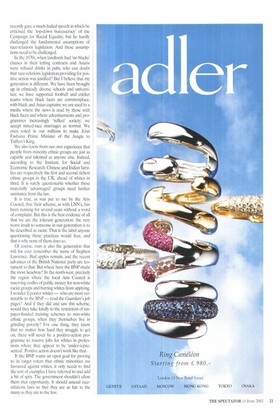How to win votes for the B\P
James Cartlidge says that positive discrimination is negatively discriminating against a whole generation of non-racist whites The following statement appears on the website of Carlton, owners of ITV; 'The company does not discriminate between employees or potential employees on grounds of sex, sexual orientation, marital status, religion, colour, race, ethnic origin, age or disability.' Unless, it would appear, you happen to be white.
As a freelance print journalist with an eye on one day moving into the broadcasting side, my attention was grabbed when I recently saw a recruitment advertisement for a funded training scheme in television news. The scheme sounded like a pretty good way in: it was the 'award-winning TV training scheme for news journalists' provided by London News Network (LNN), maker of London Tonight, the flagship regional news programme for Carlton. Three posts were on offer.
But there was a caveat. LNN had specified that it was looking for applicants only from the following ethnic groups: African, Caribbean, Indian, Bangladeshi, Pakistani and Chinese. I ernailed LNN to ask for an application pack, pointing out that I was 'ethnically white', and asking if this would affect my chances, The reply from LNN's personnel department was clear: 'You only qualify if you belong to the ethnic groups specified in the advert.'
It is worth reflecting on the full implications of this statement. LNN provides news to eight million Londoners, including millions of white Britons but also many thousands of 'other whites' such as Greeks, Turks, Eastern Europeans and the growing hordes from the white Commonwealth and Latin America. Yet the only in-house training scheme that LNN now operates has three places and not one of them is open to these people, for no other reason than that they are white. As the LNN personnel department confirmed, this policy also excludes Jews, since they are white.
LNN justifies this racially selective recruitment policy on the old chestnut of 'positive discrimination'; it is only recruiting from ethnic groups 'under-represented in the newsroom'. Yet LNN won't release the figures to show just how 'under-represented' these groups are: though it is notable that on the day I saw the advertisement three out of the four anchors on the BBC 1 and ITV national and London news were black or Asian.
Moreover, LNN admit that their newsroom isn't exactly swarming with Kurds, Turks or Greeks, even though there are hundreds of thousands of them living in London. But if someone from these groups applied to LNN's training scheme, they would be turned down for not belonging to one of the 'under-represented' ethnic groups arbitrarily listed in the advertisement.
LNN is not alone. The Observer is recruiting for an internship with six places, at least two of which will be reserved for ethnic-minority applicants However, where LNN and the Observer offer two or three places for nonwhites only, another recent Guardian job advertisement from the Arts Council in the north-west specified a -Positive Action Trainee Programme offering ten placements to people from the following communities: African, Caribbean, Chinese and South Asian'. Each successful applicant would receive a £12,000 bursary.
Unlike LNN, the Arts Council is publicly funded. Over the next three years it will receive £2 billion from taxpayers and lottery sales. Nearly all of the £120.000 of public money provided for these bursaries will therefore have come from the pockets of 'whites"; but people in the north-west, of that derivation, will not be able to benefit from one penny.
What if a white person turned up for an interview? 'We would have to show them the door,' says Paulette Clunie, access officer for Arts Council North West. Would they accept any white people? Apparently, they would make an exception for a white South African who felt that he or she was of 'African' origin; they would also accept applications from whites with a 'small amount of black blood'. And what of white ethnic groups, such as Turks'? Ms Clunie says, 'Of course Turks are under-represented in the arts, hut we've chosen to focus on the other ethnic groups.'
The Arts Council's justification for racial selectiveness is the same as that at LNN, 'under-representation', and they point to a survey showing that of 2,900 people employed in 18 leading arts organisations across the country, only 177 were black or Asian; of these, 100 were catering staff and only one was in a senior position. Trouble is, the Arts Council says that there is no suggestion that arts recruiters are racist, which raises the simple question: if recruitment isn't racist, this low representation of blacks and Asians can only be due to a lack of applications from those groups, or a lack of applications of the appropriate quality; and is that reason enough to restrict the applications of white people who might be eminently qualified?
In fact, after consulting independent legal opinion of the highest calibre, I think that these organisations are likely to be in the right if the statistics accord, because of the provisions of the Race Relations Act 1976 which allow for positive action in certain circumstances. So what does one do? I have referred the matter to the Commission for Racial Equality. but I have not received so much as a letter in response. My own legal advice suggests that there might be some cunning courtroom ruse I could use to gain redress, but that isn't the point. Sure, I feel some resentment at not being allowed to apply for a desirable training scheme simply because of my skin colour; I resent LNN telling me that if! wanted to work for them, 'asking questions [about the positiveaction programme] was not the right way to go about it', but I am not interested in joining the compensation culture. The problem here is not legal; it is political.
I have no doubt that the overwhelming majority of the British public, while possibly accepting the notion of 'encouraging' ethnic minorities into professions where they are under-represented, would recoil at reserving opportunities for certain races and effectively shutting out applications from white people. To a white person wanting to work in the highly competitive media and arts field, this 'positive action' is plain old negative discrimination against them, since they have one less avenue to pursue than do those with different coloured skin and the same employment aspirations.
But what senior political figure worthy of respect would speak out against this? Politicians and race professionals rarely miss the opportunity to seize on the latest report of abstract institutional racism, or — quite rightly — on cases of genuine and shocking racism. Yet when blatant racism against white people rears its head, who is there to speak out and challenge the status quo?
The shadow home secretary Oliver Letwin recently gave a much-hailed speech in which he criticised the 'top-down bureaucracy' of the Campaign for Racial Equality, but he hardly challenged the fundamental assumptions of race-relations legislation. And these assumptions need to be challenged.
In the 1970s, when landlords had no blacks' clauses in their letting contracts and Asians were refused drinks in pubs, who can doubt that race-relations legislation providing for positive action was justified? But I believe that my generation is different. We have been brought up in ethnically diverse schools and universities; we have supported football and cricket teams where black faces are commonplace, with black and Asian captains; we are used to a media where the news is read by those with black faces and where advertisements and programmes increasingly 'reflect' society; we accept mixed-race marriages as normal. We even voted in our millions to make John Fashanu Prime Minister of the Jungle to Tuffers's King.
We also know from our own experience that people from minority ethnic groups are just as capable and talented as anyone else. Indeed, according to the Institute for Social and Economic Research, Chinese and Indian families are respectively the first and second richest ethnic groups in the UK, ahead of whites in third. It is surely questionable whether these materially 'advantaged' groups need further assistance from the law.
It is true, as was put to me by the Arts Council, that their scheme, as with ENN's, has been running for several years without a word of complaint. But this is the best evidence of all that we are the tolerant generation: the veiy worst insult to someone in our generation is to be described as racist. That is the label anyone questioning these practices would fear, and that is why none of them does so.
Of course, ours is also the generation that will for ever remember the name of Stephen Lawrence. Bad apples remain, and the recent advances of the British National party are testament to that. But where have the BNP made the most headway? In the north-west, precisely the region where the local Arts Council is reserving oodles of public money for non-white racial groups and barring whites from applying. I wonder if poorer whites — who are most vulnerable to the BNP — read the Guardian's job pages? And if they did and saw this scheme, would they take kindly to the restriction of taxpayer-funded training schemes to non-white ethnic groups, when they themselves live in grinding poverty? For one thing, they know that no matter how hard they struggle to get on, there will never be a positive-action programme to reserve jobs for whites in professions where they appear to be 'under-represented'. Positive action doesn't work like that.
If the BNP wants an open goal for proving to its target voters that ethnic minorities arc favoured against whites, it only needs to find the sort of examples I have referred to and add a bit of spin. The government shouldn't allow them that opportunity. It should amend racerelations laws so that they are as fair to the many as they are to the few,



































































































 Previous page
Previous page